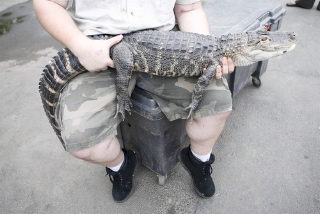Chicago River Gator
Posted by: Loren Coleman on June 21st, 2008

On June 20, 2008, the alligator above was caught in a branch of the Chicago River, Illinois; it measured 4½ feet long and about 45 pounds. The alligator was found in the Bubbly Creek, in a woodsy area near 37th Street and Racine Avenue, which at one time was one of the dirtiest parts of the river.
It just stayed submerged with its eyes popping out like in the documentaries. It was in stealth mode, I think.Bill Cox, director of human resources for Midland Metal Products
Cox was among about a dozen Midland employees who spotted the female alligator swimming laps near a secluded industrial area in the Bridgeport neighborhood. She was trapped by volunteers with the Chicago Herpetological Society.
This is the first alligator found in the Chicago River, according to the herpetological society. The group’s volunteers said they’ve confiscated 25 alligators this year, both in nature and in homes.
Source: “They found a gator in the Chicago River? Believe it,” by Mary Owen, Chicago Tribune, June 21, 2008.
About Loren Coleman
Loren Coleman is one of the world’s leading cryptozoologists, some say “the” leading living cryptozoologist. Certainly, he is acknowledged as the current living American researcher and writer who has most popularized cryptozoology in the late 20th and early 21st centuries.
Starting his fieldwork and investigations in 1960, after traveling and trekking extensively in pursuit of cryptozoological mysteries, Coleman began writing to share his experiences in 1969. An honorary member of Ivan T. Sanderson’s Society for the Investigation of the Unexplained in the 1970s, Coleman has been bestowed with similar honorary memberships of the North Idaho College Cryptozoology Club in 1983, and in subsequent years, that of the British Columbia Scientific Cryptozoology Club, CryptoSafari International, and other international organizations. He was also a Life Member and Benefactor of the International Society of Cryptozoology (now-defunct).
Loren Coleman’s daily blog, as a member of the Cryptomundo Team, served as an ongoing avenue of communication for the ever-growing body of cryptozoo news from 2005 through 2013. He returned as an infrequent contributor beginning Halloween week of 2015.
Coleman is the founder in 2003, and current director of the International Cryptozoology Museum in Portland, Maine.










I was thinking about the recent explosion of all these non-native animals that are being found, that we are assuming are released pets. And I have wondered to myself why all of a sudden has there been this increase? I have a thought.
As we know the economy here in the U.S. is not at its best. With gas prices going up, this brings about rises in other aspects of our lives. Over the last year to 6 months prices of living have spiked, and I thought perhaps there is a correlation here. Perhaps people purchased these exotic pets and as prices of living shot up they simply couldn’t afford these pets anymore and they simply released them. Hence the “boom” in releases. I would not be surprised if we keep seeing more and more exotic creatures found as prices continue to increase. It is just a thought.
No doubt some are released for simply growing to big and becoming unmanageable which we know happens.
You’ve hit on a good point, Andrew Minnesota. Energy costs for maintaining exotics, especially exotics like reptiles which depend on environmental heating and cooling to survive, are high. The costs of animal feed, of every kind, has skyrocketed. Feed prices for horse and other livestock feeds has tripled in some cases; chicken feed can not be had for “chicken feed” anymore. I paid $18 for a 50 lb bag of rabbit food the other day. There has been an drastic increase in the number of dogs, cats, and other animals surrendered to animal shelters too, and most shelters either have limited space for exotics, or simply don’t accept them at all. There are exotic pet rescue organizations, but many people don’t know about them, or else live too far away to use them.
Compounding that is the fact that most people who acquire an exotic pet just do not know what to expect from it, and are unable to cope when it exhibits natural behavior such as biting or predation. In some areas they are illegal to own, and so the person feels that since they cannot relinquish the animal without suffering legal consequences, and they don’t want to kill it, they abandon it. It’s not right, but it happens.